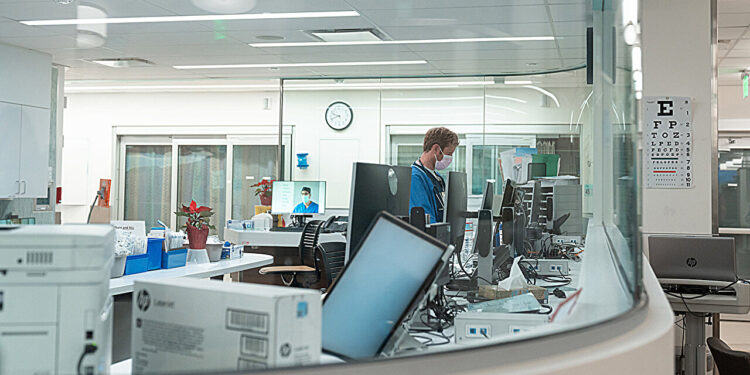In the new study, researchers found that by using a unique AI algorithm in UC San Diego Health’s emergency departments, they were able to quickly predict sepsis infection in patients at high risk and reduce mortality by 17%. Credit: UC San Diego Health
Each year, at least 1.7 million adults in the United States develop sepsis and about 350,000 will die from this serious blood infection that can set off a potentially deadly chain reaction throughout the body.
In a new study, published in published in npj Digital MedicineResearchers at the University of California San Diego School of Medicine used an artificial intelligence (AI) model in UC San Diego Health emergency departments to quickly identify patients at risk of sepsis infection.
The study found that the AI algorithm, titled COMPOSER and previously developed by the research team, resulted in a 17% reduction in mortality.
“Our COMPOSER model uses real-time data to predict sepsis before obvious clinical manifestations,” said study co-author Gabriel Wardi, MD, chief of the division of critical care in the Department of Medicine at emergency room at UC San Diego School of Medicine. . “It operates quietly and safely behind the scenes, constantly monitoring each patient for signs of possible sepsis.”
Once a patient checks into the emergency department, the algorithm begins to continuously monitor more than 150 different patient variables that could be related to sepsis, such as lab results, vital signs, medications current status, demographics and medical history.
If a patient has multiple variables, leading to a high risk of sepsis infection, the AI algorithm will notify nursing staff via the hospital’s electronic health record. The nursing team will then review with the doctor and determine appropriate treatment plans.
“These advanced AI algorithms can detect patterns that are not initially obvious to the human eye,” said study co-author Shamim Nemati, Ph.D., associate professor of biomedical informatics and director in predictive analytics at UC San Diego School of Medicine. “The system can look at these risk factors and come up with a very accurate prediction of sepsis. Conversely, if the risk patterns can be explained by other conditions with a higher level of confidence, no alerts will be sent. “
The study examined more than 6,000 patient admissions before and after COMPOSER was deployed in emergency departments at UC San Diego Medical Center in Hillcrest and Jacobs Medical Center in La Jolla.
This is the first study to report improved patient outcomes using an AI deep learning model, which uses artificial neural networks as checks and balances to safely and correctly identify patient health problems. The model is able to identify complex and multiple risk factors, which are then reviewed by the healthcare team for confirmation.
“It is through this AI model that our teams can deliver life-saving therapy to patients more quickly,” said Wardi, an emergency medicine and critical care physician at UC San Diego Health.
COMPOSER was activated in December 2022 and is now also used in many hospital units at UC San Diego Health. It will soon be activated at the health system’s new location, UC San Diego Health East Campus.
Additionally, the health system recently launched a pilot project in which Epic, a cloud-based electronic health records system, and Microsoft’s generative AI integration automatically compose more compassionate message responses via ChatGPT , thus relieving this additional step from doctors and caregivers so that they can concentrate on the patient. care.
“Integrating AI technology into the electronic health record helps deliver on the promise of digital health, and UC San Diego Health has been a leader in this area to ensure AI-based solutions support high reliability in patient safety and quality healthcare. ” said study co-author Christopher Longhurst, MD, executive director of the Jacobs Center for Health Innovation, and chief medical officer and chief digital officer at UC San Diego Health.
Co-authors of this study include Aaron Boussina, Theodore Chan, Allison Donahue, Robert El-Kareh, Atul Malhotra, Robert Owens, Kimberly Quintero and Supreeth Shashikumar, all at UC San Diego.
More information:
Aaron Boussina et al, Impact of a deep learning sepsis prediction model on quality of care and survival, npj Digital Medicine (2024). DOI: 10.1038/s41746-023-00986-6. www.nature.com/articles/s41746-023-00986-6
Provided by University of California – San Diego
Quote: Study: AI monitoring tool successfully helps predict sepsis and saves lives (January 23, 2024) retrieved January 23, 2024 from
This document is subject to copyright. Apart from fair use for private study or research purposes, no part may be reproduced without written permission. The content is provided for information only.



